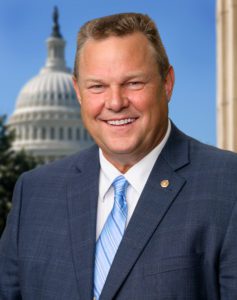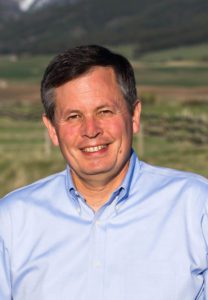By Amanda Eggert EBS Senior Editor
BIG SKY – The early weeks of 2017 have been marked by significant transition and vigorous debate in the United States’ lawmaking bodies and courts. The debate isn’t confined to the government, though: The intense political engagement evident on the media feeds of Montanans also extends to local streets and living rooms.
EBS interviewed Montana’s two U.S. senators for their opinions about the transition that’s accompanied President Donald Trump’s Jan. 20 inauguration. Sen. Jon Tester spoke with EBS on Feb. 3 and Sen. Steve Daines was interviewed on Feb. 10. Their remarks have been edited for brevity and clarity.
 Explore Big Sky: There’s recently been an incredible amount of rancor between Republican and Democrat lawmakers. What do you believe can be done to break down partisan politics and change the tone of the discourse?
Explore Big Sky: There’s recently been an incredible amount of rancor between Republican and Democrat lawmakers. What do you believe can be done to break down partisan politics and change the tone of the discourse?
Jon Tester: I just introduced three bills on campaign finance reforms. I think the way campaigns are run now—how long they run and the amount of money that’s poured into them, especially by dark money groups—increases partisan politics.
There are a lot of things we can work together on, but I think that money coming into campaigns drives individuals to the far right and the far left. We used to get 70 percent of the work done in the middle, but it seldomly happens that way anymore. In fact, we just don’t get anything done. I think a good part of that has to do with campaign finance, dark money and how’s it’s totally been blown up since the Supreme Court’s Citizens United v. Federal Election Commission decision.
EBS: You’ve said you’ll move forward with Supreme Court justice nominee Neil Gorsuch’s hearing even though other Democrats are taking a different tack and mirroring Republicans’ approach when former president Barack Obama nominated Merrick Garland. Explain your thought process.
J.T.: I’ve got to meet the guy to give him a fair shake. I believe in giving people a fair shake. I need to find out where nominees stand on the U.S. Constitution, campaign finance reform, and making sure women and minorities are treated equally.
Montana’s a Libertarian state and I think freedom’s something that we very much value—freedom and privacy. I’m going to ask Gorsuch a lot about individual freedoms and privacy.
EBS: Are there cabinet nominees or appointments that you’re particularly concerned about?
J.T.: I’m concerned about a number of them. I think there’s a fair amount of anxiety about the potential direction of his Cabinet pick of Betsy DeVos for Secretary of Education. We’ve gotten thousands of comments from people concerned about her and whether or not she understands the value of public education.
I did not vote for Rex Tillerson because I just did not think he could separate himself from Exxon and I also thought he had some connections with Russia that, quite frankly, upset me. That being said, he is confirmed as Secretary of State now and I want to be able to work with him whenever possible to try to do the right thing for this country.
I also have real problems with Scott Pruitt, the nominee to lead the Environmental Protection Agency. Climate change is real; I see it on my farm every day and I can tell you that if we ignore it, that’s the easy way out.
We have to have somebody in the EPA who has commonsense solutions and doesn’t over regulate, but ensures that we have clean air and clean water. We need someone who ensures corporations that pollute pay for the pollution—not the taxpayers. I just don’t see that in Pruitt at all.
EBS: From what you’ve seen as a congressman, what’s been the most challenging aspect of Trump’s presidency thus far?
J.T.: I think the most challenging aspect of this is the number of executive orders. Obama did some of this, but he didn’t have the control over the House and the Senate and he didn’t get what he needed on certain issues so he chose to do this. But he didn’t do it everyday, and he didn’t do it multiple times every day.
We have three branches of the government for a good reason—to be checks on one another. So far he has cut the Legislative branch out. And the interesting part is the Legislative branch has majorities of his own party. That’s been a bit challenging, I would say.
EBS: Do you think there are specific skills or qualities that will serve President Trump particularly well in this role?
J.T.: I think he’s a master communicator. I think that he oftentimes relays information that may not be absolutely the truth, but he does it in such a way that people believe it.
I think some of the things he wanted to do on “draining the swamp” and infrastructure are things that could serve him well. I don’t necessarily think he’s drained the swamp with his Cabinet nominees. Some of them are very good, and others are more alligators to the swamp, quite frankly.
All of that aside, he would not be elected president if he did not have skills and I think his strength is communication.
______
 Explore Big Sky: What do you believe can be done to break down partisan politics and change the tone of the discourse?
Explore Big Sky: What do you believe can be done to break down partisan politics and change the tone of the discourse?
Steve Daines: The U.S. Senate has been described as the greatest deliberative body in the world and it’s important that civility and statesmanship is upheld and modeled on the floor of the Senate.
There was a great speech by Marco Rubio this week admonishing both sides and insisting that whether you’re a Democrat or a Republican, the United States Senate must behave in a civil manner. We can have vigorous disagreements, but not personal attacks.
One way to do that is by working on bipartisan legislation. I just introduced a bill with Amy Klobuchar, a Democrat from Minnesota. One of my mentors in the Senate is Dianne Feinstein, a Democrat from California. I think ultimately it comes down to a person-to-person relationship, building trust, and that needs to be modeled in the U.S. Senate.
EBS: Are there any issues—in terms of both legislation and the confirmations of Trump’s Cabinet—where you’d be willing to break with the Republican ranks and go a different way?
S.D.: Historically the Senate has given the president the Cabinet that he or she chooses. The lack of bipartisan support that we’re seeing for these Cabinet nominees is virtually unprecedented. Generally Congress will give the president the Cabinet that he nominates.
It’s getting tougher nowadays, but I look at every Cabinet official through the lens of “Is this the right fit for Montana and our country?” I’ve had long conversations with every nominee before I will make a decision to support them. I think whether it’s a Republican or a Democrat, generally we should be getting behind the president after an election.
I broke ranks with the party on the vote for the USA Freedom Act because I put the privacy of Montanans as a very important Fourth Amendment right. I broke ranks with Republicans and I have a healthy distrust of the federal government’s intrusion into our lives.
EBS: Are there any Cabinet nominees that have a conflict of interest or other issues that are concerning to you?
There are still a few more nominees to go. We’re going to be examining them. Before they go through the hearings, they have extensive FBI background checks and fill out extensive disclosures on financial transactions. I’m ready to get some more information on nominees that are yet to come through the Senate. If we see something in there that rises to an issue where that person’s not qualified to serve, I will not be afraid to flag it.
EBS: Public land is an important issue in Montana because we have so much federally-owned land and outdoor recreation is a large part of our economy. Last year the GOP platform included the sale or transfer of public land. Where do you come down on that?
S.D.: I oppose the transfer of federal land to the state. I realize that it may be a Republican platform, but I don’t agree with it. I do support the state having a stronger voice and a greater say in the management of our public lands in Montana. I think that’s important, and most Montanans agree with that.
EBS: If there’s one thing that you could say to President Trump in regards to how he’s handled the presidency during the past three weeks, what would you tell him?
S.D.: I would say, “I look forward to bringing you out to Montana.” I know he wants to get out and visit the state and I’d tell him that I’m looking forward to having him come to our state. He is passionate about jobs and I’ve already made some suggestions to his administration in regards to jobs here in Montana.
He is an advocate for the hardworking men and women that oftentimes have gone unnoticed and have almost been forgotten. He is a champion for the working class in this country. I’d like to see him come out to Montana and spend some time with us.














